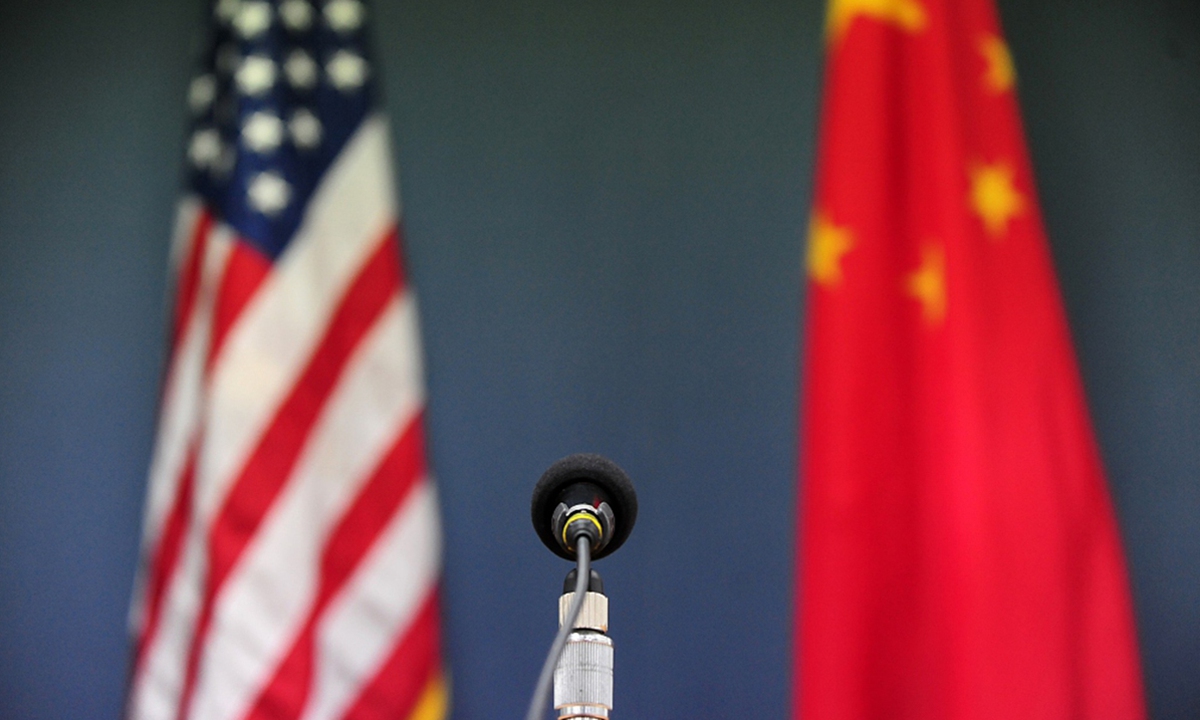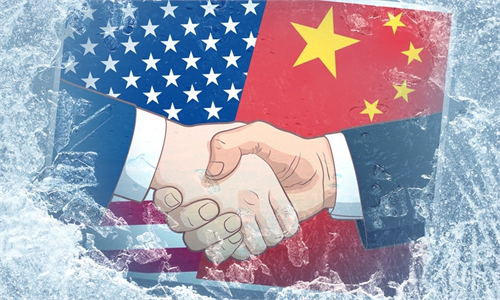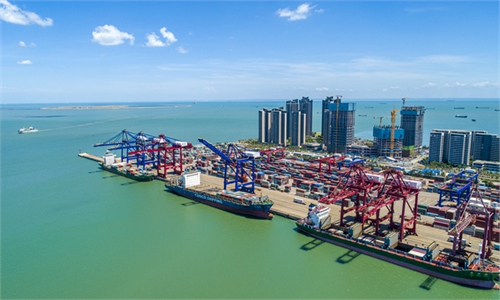
China US Photo: VCG
As US President Joe Biden embarked on his first overseas trip to seek deepening ties with his allies at the G7 summit, tensions between the US and China, the world's two largest economies, seem to continue escalating following a series of recent aggressive moves by Washington while talks on trade by the two sides have made progress.
Experts said that targeting China in a full range from high technology to security strategies while encouraging its allies to take a tougher stance on China will only drag the US further onto the wrong path and see it shooting itself in the foot badly.
Chinese and US trade officials held another round of "candid" talks on Thursday and agreed to promote "pragmatic" trade and investment cooperation, which was the third discussion over a two-week period between top Chinese and US economic and trade officials since Biden took office.
Chinese Vice Premier Liu He held a virtual meeting with US Treasury Secretary Janet Yellen on June 2. Liu held a phone call with US Trade Representative Katherine Tai on May 27.
China's Commerce Minister Wang Wentao and US Commerce Secretary Gina Raimondo had a "candid and pragmatic" exchange of views on relevant issues of mutual concerns in the business sector, according to a statement on the website of China's Commerce Ministry (MOFCOM) on Thursday.
Both sides agreed to promote pragmatic cooperation in trade and investment and properly handle differences, while maintaining working communication, read the statement.
A spokesperson from the MOFCOM told a press conference one June 3 that China and the US have resumed "normal communication" in the economic and trade fields, and will work together to solve "specific problems" in a practical manner for producers and consumers.
The frequency of China-US trade talks signified that the US has realized the importance and necessity of having China-US economic trade ties back on the right track following damages caused by the trade war against China initiated during the Trump era and the ongoing pandemic, said Gao Lingyun, a trade expert at the Chinese Academy of Social Sciences in Beijing.
"Sound and stable China-US economic and trade ties will only benefit the US, instead of causing harm like the US has imagined," Gao told the Global Times on Thursday.
According to a study by Oxford Economics in January this year, the cost of the trade war for the US was around 0.5 percent of GDP in 2018-2019, an estimated 245,000 jobs and $88 billion in real household income. If the scenario escalates, US GDP will shrink by $1.6 trillion over the next five years and result in 732,000 fewer jobs in the US in 2022.
Against the backdrop of seeking strength from allies in Europe at the G7 summit, recent engagements between Chinese and US senior officials on trade and finance show that the Biden administration finally decided to deal with bilateral ties from a position of true strength, Lü Xiang, a research fellow in US studies at the Chinese Academy of Social Sciences in Beijing, told the Global Times Thursday.
"It's like after four or five months, Biden finally figured out that the US wasn't that strong and knew he hit the ceiling… he decided to have talks with China and also visit his allies to borrow some 'strength' in dealing with China ties," Lü said.
Biden has arrived in the UK ahead of the G7 summit in Cornwall, which is scheduled to be held from Friday. An article released by the Guardian on Tuesday said that Biden's mission at the summit is to "recruit allies for the next cold war."
Lü said that Biden's trip to Europe to seek more assistance from allies may "turn into an agenda that may not be happy or pleasant" as members of G7 are at odds regarding their interests involving China.

Police gather to patrol a checkpoint in St. Ives, Cornwall, England on Thursday. Security in the area is being tightened ahead of the upcoming G7 meeting taking place in Carbis Bay. G7 leaders and guests will meet in the Cornish resort starting Friday. Photo: AP
The wrong pathRecent moves made by the US showed that dialogue and confrontation will continue defining China-US ties, which are set to see tensions intensify, experts told the Global Times.
The US continues to step up its pressure against China in a wide range of geopolitical and high-tech areas in a series of recent actions.
The Biden administration on Wednesday revoked a Trump executive order to ban TikTok and WeChat but called for a broader review on a number of foreign-controlled applications that could pose a security risk to Americans and their data. The move in reality is a continuation of Trump's hostility toward China to crack down on Chinese high-tech firms under the guise of national security, analysts said.
In response to the revocation, a spokesperson from the MOFCOM said in a press conference on Thursday that it is "an active step in the right direction." However, the US requires a review of the security risks of foreign applications, plus the US Committee on Foreign Investment is still reviewing TikTok, "which we hope will treat Chinese companies fairly and avoid politicizing economic and trade issues."
Even as trade talks have resumed, the Biden administration has in recent days stepped up crackdowns on Chinese businesses, including blacklisting nearly 60 Chinese companies. Also, the US Senate on Tuesday passed a so-called innovation and competition act, which seeks to bolster the US' technological innovation capabilities and competitive edge against China through massive government subsidies.
As for the US' new bill, the MOFCOM spokesperson criticized the behavior of linking one country's own development with the containment of others.
Despite bilateral communications having returned to normal in the economic and trade spheres, tensions between the world's two largest economies have been marching toward an irreversible trend of escalation until the moment that Washington realizes its hawkish lines and poisonous policies toward Beijing could become futile and harm itself, He Weiwen, a former senior trade official and an executive council member of the China Society for World Trade Organization Studies, told the Global Times on Thursday.
As the US ramps up confrontation, including sanctions against more Chinese businesses and products, pressuring allies to turn against China and interfering in China's internal affairs regarding the island of Taiwan, China has full space to roll out countermeasures, said He.
The country's top legislature passed the Anti-Foreign Sanction Law on Thursday, the first one of its kind, providing strong legal support and guarantees for China against unilateral and discriminatory measures imposed by other countries.
"The US will not only reap nothing from its policies against China, but also has to deal with the consequences of its shooting itself in the foot badly," He noted.
Liu Weidong, a research fellow at the Institute of American Studies at the Chinese Academy of Social Sciences, told the Global Times on Thursday that the US has not intended to push its hostile policies against China into a dead end, which won't achieve anything.
"But it does not mean that confrontation and containment will ease, which was forecasted to continue when Biden took office in January. Compared with Trump's high-key and frenzied tactics, Biden's added pressure on China will be more calculating and concise, and we need to prepare in an all-round way," said Liu.
Observers also said the influence of the G7 summit should not be overestimated. The group should learn lessons and repair their pandemic-hit economies. European countries have their own plans, welcoming US leadership but not jeopardizing their cooperation with China.
The total GDP of these seven countries combined has dropped from 80 percent in the 1970s to about 40 percent of the world's total today, and their ability to influence the world is also declining, experts said, adding that US allies will tread lightly regarding US calls to crack down on China.
"Cooperation in the business circles will not be dented because enterprises will vote with their feet," said He.
The latest survey released by the European Union's Chamber of Commerce in China showed on Tuesday that nearly 60 percent of European companies plan to expand their businesses in China this year, an increase of nearly 10 percentage points from 51 percent recorded last year.








